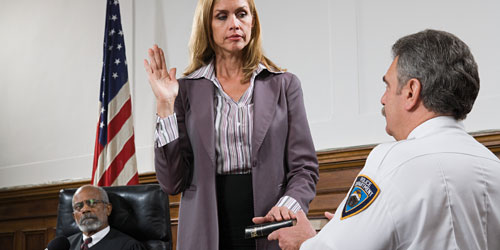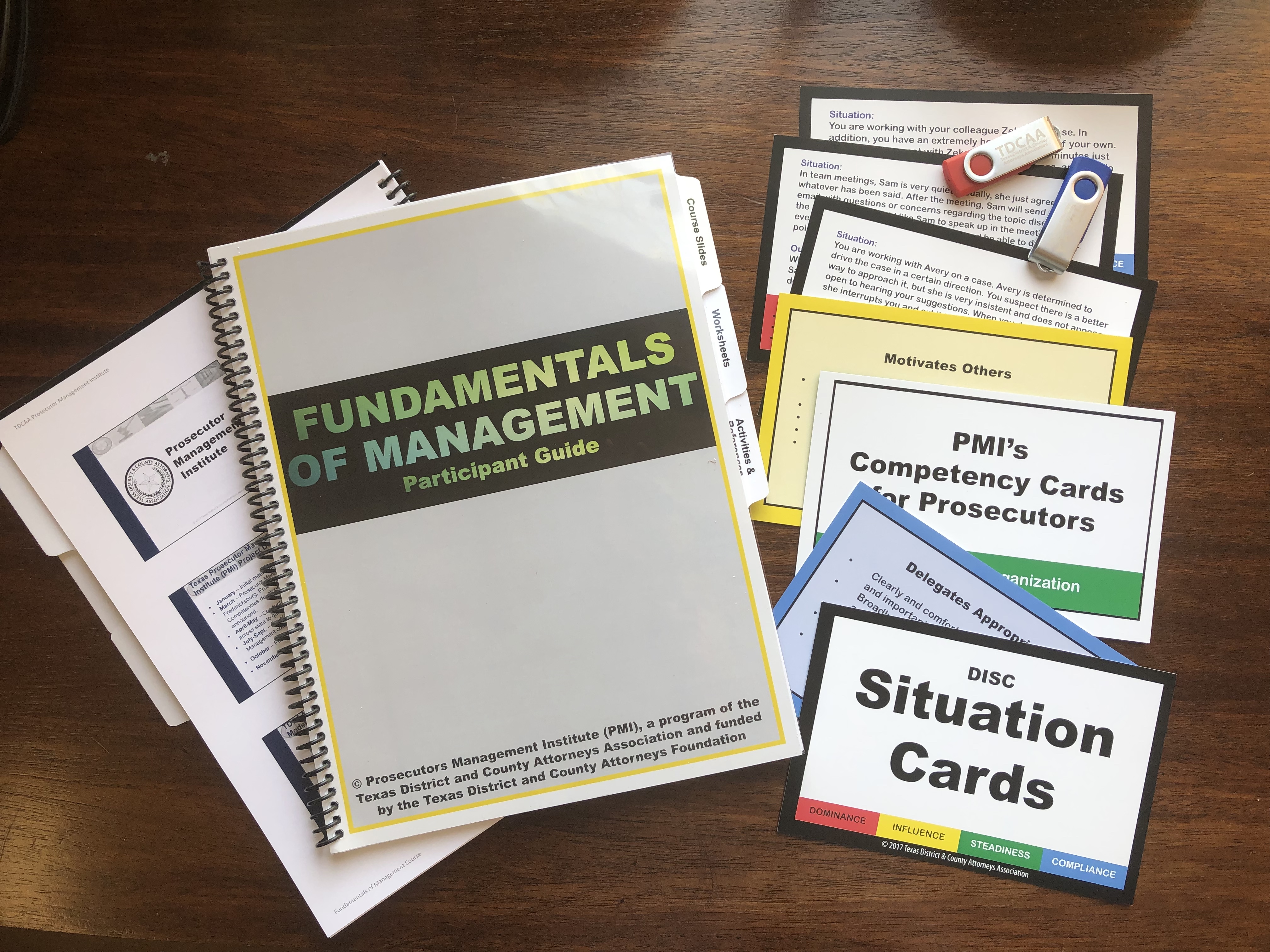Annual Conference recap
What a great turnout for this year’s Annual Conference in Corpus Christi! After all the dust settled, we counted 1,039 speakers, attendees, exhibitors, and others who moved the turnstiles at our largest conference of the year. We also recognized several members of our association for their public service, including Fort Bend County DA Brian Middleton (2022 Prosecutor of the Year), Potter County CA Scott Brumley (2022 Prosecutor of the Year), Tarrant County CDA Sharen Wilson (Lone Star Prosecutor), Hill County DA Mark Pratt (Lone Star Prosecutor), Rusk County ADA Zack Wavrusa (Oscar Sherrell Award for service to TDCAA), and Dallas County ACDA Jen Falk (C. Chris Marshall Award for training excellence).
Many thanks to all who joined us in Corpus. And for those of you already turning your attention to the 2023 Annual Conference … stay tuned! We will have more information on the location and timing of that event in the coming weeks. (How’s that for a teaser?)
Mandatory Brady training now available
The new 2022 version of TDCAA’s Mandatory Brady Training is now available online. All of you should’ve received an emailed flyer about the course, but here are more details:
- Tex. Gov’t Code §41.111 (Training Related to Prosecuting Attorney’s Duty to Disclose Exculpatory and Mitigating Evidence) and related rules adopted by the Court of Criminal Appeals require prosecutors to complete specific training every four years on a prosecutor’s duty to disclose exculpatory and mitigating evidence. (This includes any special prosecutor or prosecutor pro tem who handles even a single criminal case, so be sure those lawyers know about this training obligation!)
- This mandatory training requirement does not apply to lawyers in a prosecutor’s office who exclusively handle Class C misdemeanors or civil matters.
- The most recent version of this course was offered online starting in 2018, so many prosecutors will need to take the 2022 course by the end of this calendar year to remain in compliance.
- New prosecutors have 180 days after they begin employment to complete the training.
- The course is free and open to anyone, including those not statutorily required to take it.
- TDCAA will report 1.25 hours of MCLE (including 1.25 hours of ethics) to the State Bar for anyone who completes the course and will annually report to the Court of Criminal Appeals a list of those attorneys in compliance.
You can access the course at https://www.tdcaa.com/training/mandatory-brady-training-2022/. For questions, call us at 512/474-2436.
Stephens v. State redux and “Texas Prosecution 101”
On Wednesday, the Court of Criminal Appeals declined to reconsider its original opinion in State v. Stephens, the election fraud case from last December that confirmed the constitutional ban on the state attorney general’s unilateral authority to prosecute crimes in Texas. For details about the very interesting concurrence and two dissents to that denial of rehearing, check out today’s TDCAA Case Summaries (and some curated quotes included below).
On the heels of this denial of rehearing—which should shock no one, as the original decision was consistent with almost 150 years of Texas jurisprudence (as thoroughly researched and reported in one of the dissents)—yet more complaints about non-prosecution have already been raised. Perhaps the most overwrought was this recent press release from the Texas Public Policy Foundation (TPPF). While its non-prosecution narrative is unsupported by fact—perhaps because actual facts would disprove the desired political narrative during peak campaign season—we all know how little facts can matter in some public policy debates. More instructive for you may be the author’s proposed solutions: creating a statewide Office of Election Integrity for investigating those cases and new regional judicial districts with new judges and district attorneys authorized to prosecute civil and criminal violations of the election laws. It is unclear how any of that would actually work in practice (other than being extremely expensive to the state), but you can be certain that such legislation will be filed next session along with measures to authorize recall elections for local prosecutors (which is of dubious constitutionality and may therefore require a constitutional amendment—but we can discuss that in more detail when the time comes).
All of this chatter about prosecution is why we updated and reissued our FAQ-style memo on who prosecutes what in Texas earlier this month. Visit Texas Prosecution 101 and share as needed to help ensure public policy decisions are not made in a vacuum of misinformation next session.
Post-Dobbs abortion-related litigation
In the wake of the U.S. Supreme Court’s decision in Dobbs to return the legality of elective abortion to the states, several local prosecutors and the attorney general have been sued in a federal lawsuit seeking to enjoin them from enforcing any of Texas’ criminal laws against nonprofits and others that want to help pay for Texans’ abortions out of state. For a background summary of that litigation, see this helpful blog post from TCJL from earlier this month.
As of now, no class action has been certified that would apply this litigation to all county and district attorneys in the state. However, the individual prosecutors named in the suit have agreed not to enforce the laws at issue until the federal litigation is concluded. An initial ruling from the trial court is expected in the coming weeks, and we will provide updates as warranted.
Legislative appropriation requests
Staff from the Legislative Budget Board (LBB) and the governor’s office began hearing the initial legislative appropriations requests (LARs) from various state agencies this month, including those within the judicial branch. The LAR hearing process allows every agency receiving state money to make a formal request for funding for the next biennium. Those agencies usually begin by formally asking that current funding levels be maintained and then put forth requests for additional funding, known as “exceptional items.” As the budgeting process moves forward into the regular session, those exceptional items will be considered first by LBB and then by the appropriate budget committees of each chamber, and some lucky exceptional items will make it into the final budget adopted by the full legislature in May of next year.
The (limited) funds that prosecutors receive from the state run through the Judiciary Section of the Comptroller’s Office. That agency traditionally does not request exceptional items on behalf of its beneficiaries, so Comal County CDA Jennifer Tharp and 46th Judicial DA Staley Heatly, your Legislative Committee Co-chairs, made in-person requests this week for three exceptional items: increased assistant prosecutor longevity pay, parity with the salary increases that judges may receive based on years of service, and credit towards that service for time spent in other positions. Here are more details on each of those proposals.
Assistant prosecutor longevity pay
Under this current program (as enacted in 2001), assistant prosecutors receive $20 a month per year of service starting in their fifth year as a prosecutor (for an initial annual supplement of $960 in that fifth year) but are capped at a maximum of $5,000 (not reached until after their 20th year of service). Under the proposal developed by TDCAA’s Compensation Committee and presented to the LBB by Jennifer Tharp, assistants would receive $100 a month per year of service starting in their third year of service ($2,400 in year three), with a cap of $10,000 reached after nine years of service. These increases are estimated to cost the state an additional $29+ million for the FY 2024–2025 biennium (in addition to the projected $9.45 million cost of the current program).
Salary parity and cross credit
The second and third proposals from TDCAA’s Compensation Committee are related to courthouse pay parity between judges and prosecutors and were presented to the LBB by Staley Heatly.
Elected felony prosecutors are seeking a third increase in compensation after 12 years of service that is comparable to the $8,500 in annual longevity pay a district judge receives at that stage. The biennial cost to the state of this additional salary tier for prosecutors would be roughly $824,500.
And finally, the Compensation Committee recommended that “cross-credit” be granted for prosecutors and judges when calculating years of service for salary purposes. Currently, judges receive credit for time served in various judicial roles when calculating their salary level, but time served as a district or county attorney does not count. Similarly, district attorneys and county attorneys do not receive credit for time served as an elected prosecutor in any office other than the one currently held, nor do they receive credit for time served as a judge. Under this third proposal, eligible judges and county and district attorneys would receive credit for time served in any of those various elected offices for the purpose of calculating their current salary. This would enable prosecutors and judges to switch roles without a financial penalty—something that is vital to ensuring good candidates and officeholders in areas of the state where lawyers are scarce. Such a change would cost the state roughly $707,000 for the FY 2024–2025 biennium.
Thanks to Jennifer and Staley for getting the ball rolling!
Other related funding requests
There were also exceptional item requests for pay raises from Jack Choate, executive director of the Special Prosecution Unit, and by the chairman of the state’s Judicial Compensation Commission—and the latter request was a big ’un. That commission is recommending that the current $140,000 benchmark salary for district court judges be increased by 22 percent over the next biennium. Of course, this impacts the pay and supplements of not just judges, but also any prosecutors who are tied to that benchmark salary. The resulting cost of this exceptional item is estimated to be $49+ million over the next biennium. Raising that base pay figure has always been a thorny issue at the capitol because legislators’ retirement benefits are tied to it, so we shall have to wait and see how that proposal fares again this session.
At other budget hearings, the Office of Court Administration (OCA) and various other courts and judicial branch entities are requesting 10 percent salary raises for court and agency staff (other than elected judges). That amount seems to be a pretty standard agency request heading into the next session, regardless of agency or branch of government. (Another example is the Office of Attorney General, which has requested an exceptional item of roughly $75 million for both general and targeted salary increases for its lawyers and other staff, plus an addition $15 or so million for its criminal investigation division employees.) The OCA also requested additional funds to upgrade various data and appellate case management systems, and the Texas Indigent Defense Commission (TIDC) requested an exceptional item of approximately $50 million to fund new regional public defender offices in rural regions of the state.
Going forward, LBB-sponsored hearings will continue into October, so check back next month for more updates on requests from agencies like DPS, TDCJ, and others.
Interim committee news
Among the legislative hearings from September that might be of interest to some of you are the following:
The House Committee on Public Health heard testimony on opioid abuse and the dangers of fentanyl.
The Senate Committee on Local Government reviewed issues surrounding so-called “taxpayer-funded lobbying,” but no new ground was plowed on this issue (which is sure to come up again next session).
The House Juvenile Justice & Family Issues Committee reviewed barriers to reporting domestic violence and obtaining protective orders, including expert testimony from Tarrant County ACDA Marvina Robinson, Dallas County ACDA Sharron Archie, and El Paso County ACA Aaron Setliff.
Upcoming hearings
Among those relevant interim charges officially posted for hearings in October so far are:
Monday, October 3
House Judiciary & Civil Jurisprudence + House Juvenile Justice & Family Issues (joint hearing)
10:00 a.m., Capitol Extension Room E1.030
Charge: Judicial caseloads along the Texas-Mexico border (invited testimony only)
Wednesday, October 12
House Judiciary & Civil Jurisprudence
9:00 a.m., Room E2.016
Charges: Guardianships, jury service eligibility (invited testimony only)
House Select Interim Committee on Criminal Justice Reform
1:00 p.m., Room E2.016
Charges: bail reform, drug crimes, civil asset forfeiture, jury instructions, sentencing guidelines (invited testimony only)
Thursday, October 13
House Select Interim Committee on Criminal Justice Reform
9:00 a.m., Room E2.016
Charges: policing reform, prosecutorial discretion, uses of detention and incarceration, transparency in policing/prosecution (including the grand jury process) (invited testimony only)
Key Personnel–Victim Services Board elections
Elections for the 2023 TDCAA Key Personnel–Victim Services Board will be held on Thursday, November 3, 2022, at 1:15 p.m. during our Key Personnel & Victim Assistance Coordinator (KP & VAC) Conference in San Antonio. Seats up for selection this cycle are the West (Regions 1 & 2) and North Central (Regions 3 & 7) representatives. (The TDCAA regional map is available HERE.) To be eligible, each candidate must have the permission of his or her elected prosecutor, attend the elections in-person at the conference, and have paid membership dues prior to the meeting. For more details on these elections, email Jalayne.Robinson@tdcaa.com.
Mock trial judges needed
South Texas College of Law’s Trial Advocacy Center is hosting a preliminary round of the national All-Star Bracket Challenge mock trial competition on the weekend of October 8–9, 2022, but judges are needed to preside over the criminal case that competitors will be handling. This regional round is being conducted remotely over Zoom and volunteer judges can claim three hours of CLE for their time. If interested, contact Director Brandon Draper at bdraper@stcl.edu for more details.
Scattershooting
Here are some stories of late that you might’ve missed:
- “Court rejects AG Ken Paxton’s bid to continue prosecuting election crimes” (Austin American-Statesman)
- “Texas AG’s office sends mixed signals about whether it can fine nonprofits that pay for out-of-state abortions” (Texas Tribune)
- “State agencies push for better worker pay as critical staffing crunch hits Texas government” (Texas Tribune)
- “Hemp was supposed to save Texas farmers during a drought. It hasn’t yet.” (Texas Tribune)
- “Satanic panic is making a comeback, fueled by QAnon believers and GOP influencers” (NBC News)
- “How vigilante ‘predator catchers’ are infiltrating the criminal justice system” (Washington Post)
- “Dysfunction in Texas AG’s office as Paxton seeks third term” (AP News)
Quotes of the Month
“Our Stephens opinion should not have surprised anyone. Since 1836, the district and county attorneys have represented the State in all criminal prosecutions in the trial courts; the Texas Attorney General (hereinafter sometimes “AG”) has never undertaken that duty. From the birth of Texas until the present day, the AG’s constitutional role in criminal prosecutions has always been limited to an advisory role or to giving assistance to the county or district attorney, and even then, only when requested.”
—Court of Criminal Appeals Judge Michelle Slaughter, in her dissent (on other grounds) to that court’s refusal earlier this week to reconsider its original opinion in State v. Stephens confirming this long-standing interpretation of the state constitution.
“The power given to district and county attorneys includes the power not only to prosecute cases but also to decide which cases should not be prosecuted. When the district or county attorney chooses not to prosecute a case, they are permissibly exercising their prosecutorial discretion; it is their prerogative to file or not file charges. If the Attorney General files criminal charges when the prosecutor has specifically chosen not to, the Attorney General unduly interferes with—he usurps—the district or county attorneys’ exercise of their prosecutorial power.”
—Court of Criminal Appeals Judge Scott Walker, in his concurrence to that court’s refusal to reconsider its prior opinion in State v. Stephens, rebutting claims in Judge Slaughter’s dissent that the state constitution might allow the attorney general to prosecute a case that a local prosecutor has declined to prosecute.
“It’s absolutely broken. It’s just broken. You don’t do it this way. I made the mistake of trusting them that they would come in and do a good job.”
—Coryell County DA Dusty Boyd (R), after the attorney general’s office dismissed cases against multiple defendants in a high-profile human trafficking investigation in his jurisdiction.
“As for judges and DA’s [sic] who release violent criminals, and choose not to enforce Texas laws, we need to remove them from office. We cannot let Democrats turn Texas into California.”
—Campaign tweet from Lt. Gov. Dan Patrick (R-Houston) posted earlier this week—and no, he’s probably not just referring to the upcoming November elections (but we’ll see!).
###



